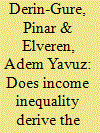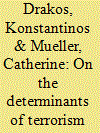|
|
|
Sort Order |
|
|
|
Items / Page
|
|
|
|
|
|
|
| Srl | Item |
| 1 |
ID:
129826


|
|
|
|
|
| Publication |
2014.
|
| Summary/Abstract |
Egypt plays a pivotal role in the security of the Middle East as the doorway to Europe and its military expenditure reflects its involvement in the machinations of such an unstable region, showing considerable variation over the last 40?years. These characteristics make it a particularly interesting case study of the determinants of military spending. This paper specifies and estimates an econometric model of the Egyptian demand for military spending, taking into account important strategic and political factors. Both economic and strategic factors are found to play a role in determining military burden/spending, with clear positive effects of lagged military burden, suggesting some sort of institutional inertia, plus negative output and net exports effects. The strategic effect as a result of the impact of Israel's military burden is mostly positive and significant, though its impact is reduced when the impact of important strategic events are taken into account. The military spending of Egypt's allies Jordan and Syria generally seems to have had no effect on Egypt's spending. These results are consistent over a range of econometric techniques.
|
|
|
|
|
|
|
|
|
|
|
|
|
|
|
|
| 2 |
ID:
129829


|
|
|
|
|
| Publication |
2014.
|
| Summary/Abstract |
This paper investigates how public trust in the Japan Self-Defense Forces (JSDF) changed after 2004 when it was sent to Iraq in support of the USA. Because Japan's Constitution clearly prohibits the use of military forces unless for self-defense purposes, public opinion was divided. I find that liberals' distrust in the JSDF grew after the deployment in Iraq relative to moderates. Somewhat surprisingly, the trust among conservatives also declined relative to moderates after the deployment in Iraq.
|
|
|
|
|
|
|
|
|
|
|
|
|
|
|
|
| 3 |
ID:
129831


|
|
|
|
|
| Publication |
2014.
|
| Summary/Abstract |
Separatist terrorism has been a severe problem for Turkey since the mid-1980s. The conventional wisdom contends that economic deprivation in southeastern Turkey is the fundamental reason for the long-running battle against the Kurdish rebels. Considering that there is limited empirical literature on the roots of terrorism in Turkey, yielding conflicting results about the claim that the main cause of terrorism is deprived economic conditions, this study aims to answer whether there is a causal relationship between income inequality and separatist terrorism in Turkey. To this end, the Global Terrorism Data Base for the period of 1973-2006, two Theil indices of pay inequality as proxy for income inequality, and the vector autoregression and Autoregressive Moving Average (ARMA) methods are utilized. The results support the early findings that income inequality, a particular focus in this paper and an essential indicator of economic deprivation, is not a main cause of escalation of separatist terrorism in Turkey.
|
|
|
|
|
|
|
|
|
|
|
|
|
|
|
|
| 4 |
ID:
129825


|
|
|
|
|
| Publication |
2014.
|
| Summary/Abstract |
Since the 1960s Olson-Zeckhauser's (1966) analysis, its 'exploitation of the great by the small' has provided economists' core model of alliance's provision of security/defense. But with the end of the Cold War, countries' allocative behavior has diverged markedly from OZ's predictions for defense as a homogeneous pure public good voluntarily provided. This paper suggests a replacement for OZ, with the essential difference that 'defense' rather than being aggregated into their single public good is disaggregated into more realistic categories of self-insurance and self-protection. Because allocative behavior in public good groups is essentially driven by income effects, we concentrate on these, which become complex and conflicted, giving much greater scope for goods-inferiority. The analysis is followed by numerical simulations, which conform to actual experienced allocations in NATO much better than the conventional 'exploitation' model.
|
|
|
|
|
|
|
|
|
|
|
|
|
|
|
|
| 5 |
ID:
129828


|
|
|
|
|
| Publication |
2014.
|
| Summary/Abstract |
Building on prior work on optimal replacement of aging aircraft, this paper presents three methodologies to evaluate prospective aviation Service Life Extension Programs (SLEPs) and applies these methodologies to US Navy F/A-18E/F data. While considerable uncertainty remains as to the values of key parameters (e.g. the cost of F/A-18E/F SLEPs), the preponderance of the evidence available at this juncture favors undertaking SLEPs on F/A-18E/Fs rather than replacing them with new Joint Strike Fighters.
|
|
|
|
|
|
|
|
|
|
|
|
|
|
|
|
| 6 |
ID:
129827


|
|
|
|
|
| Publication |
2014.
|
| Summary/Abstract |
Over the last decade, the Iranian Government budget on military has been higher than the average of the world. The current increasing international sanctions aim to reduce the military capabilities and capacities of the Iranian Government. We analyze the response of the Iranian economy to shocks in its military budget from 1959 to 2007, using impulse response functions and variance decomposition analysis. The Granger causality results show that there is unidirectional causality from the military spending growth rate to the economic growth rate. The response of income growth to increasing shocks in the military budget is positive and statistically significant.
|
|
|
|
|
|
|
|
|
|
|
|
|
|
|
|
| 7 |
ID:
129830


|
|
|
|
|
| Publication |
2014.
|
| Summary/Abstract |
We investigate whether differences in terrorism risk are mirrored on terrorism risk perception across European countries for the period 2003-2007. We find that the average propensity for terrorism risk concern is affected by actual risk levels. Country and individual heterogeneity contribute substantially to the variation of observed risk perception. Singles and individuals with white collar jobs are less likely to mention terrorism as one of the most pressing issues their country faces, while political positioning towards the right makes it more likely to be concerned about terrorism. As far as competing risks are concerned, we find that the likelihood terrorism is mentioned, decreases with spending on pensions as a percentage of GDP being higher. Finally, based on the Bayesian framework, we also examined the formation of terrorism risk perceptions, and decompose the observed country-level time series of terrorism activity into a long- and a short-run component. We concluded that the observed risk perception variation is only explained by the long-term trend of terrorism activity countries face.
|
|
|
|
|
|
|
|
|
|
|
|
|
|
|
|
|
|
|
|
|